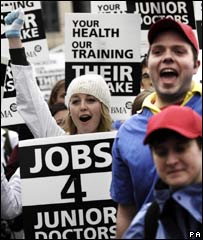MTAS: Breaks spirits, breaks doctors, breaks the law
I’ve lost count of the number of times I’ve said Mad Pat should resign. I’m starting to get a reputation. But she really is not fit for purpose. After presiding over a catalogue of failures, she’s still in post.
She thinks services for rare diseases should be scrapped, doctors and nurses who don’t wash their hands should go to prison, hospitals should treat animals alongside humans, that NHS debt doubling is a good thing, that the NHS has too many doctors and nurses, and that dirty sheets are the way forward. She’s presided over an absolutely catastrophic failure in reform of medical training, and yet still thinks the NHS has just enjoyed its best year ever. She’s even cut the most vital of services because it’s not a political priority.
And now, it’s revealed that not only was MTAS a failure in selecting the right people for the right jobs, it was also a total security shambles.
Thousands of medical students’ and junior doctors’ personal details – including mobile phone numbers, addresses, and even criminal records – were posted, unprotected, on the internet, for anyone to access. They’re even available on Google.
As if that wasn’t enough, highly sensitive personal data which was supposed to be stored anonymously and separately from personal data – things like sexuality and religion – have been posted on the internet alongside the applicants’ names.
When this was first reported to the NHS’s IT commission, they say ‘Ah, there’s not much we can do about that’. That’s when the doctors went to the media. Then Lord Hunt comes along and claims that these were posted by some malicious individual. That was not true. Then it was claimed that the details had only been visible on the web for a few hours. That was also not true. The system was so badly designed that this data was simply being stored online, without even simple password protection, and had been available to anyone with an internet connection and a titter of wit for at least three days, and almost certainly much, much longer.
But just in case that’s not terrible enough, it has emerged today that not only could such information be downloaded and seen by anyone with an internet connection, but it could also be edited. By anyone. Yep, anyone could get into any applicants online application and edit it to their heart’s content without so much as a password.
This is not only incredibly shoddy security, it’s also illegal. It’s quite clearly against the Data Protection Act, and legal experts are predicting that if any junior doctor decides to sue the government over this, then they’ve got a pretty decent chance of winning the case.
But heck, that’s not enough for this failure of a government.
The system which is currently being tested to hold patient records has managed to spew out the personal details of many consultants, including their home addresses and phone numbers. This is the super-secure system that is virtually impossible to hack, spewing out personal details onto the internet in a completely unprotected fashion.
Patricia Hewitt has presided over the introduction of a system which has destroyed confidence, made lives hell for junior doctors, and now broken the law. She’s been an unmitigated failure of a Health Secretary, and has done damage to the NHS that will take years to put right.
I don’t think I can ask her to resign again. The fact that she’s been through all this and not even considered tendering her resignation tells us everything we need to know about her, and everything we need to know about New Labour, and everything we need to know about political integrity. There’s none left.
This post was filed under: Health, News and Comment, Politics.

 The OFT published a
The OFT published a  In the series opener of her US chat show, Tyra Banks takes on the media, complaining about a photo that was published of her under headlines suggesting she’d gained forty pounds. The tirade she unleashes was heavily promoted beforehand, and it is clearly something of a ratings-grabbing stunt. I’ve included a eight-and-a-half minute chunk of the programme below, to set the whole thing in context for the majority of my readers who may have missed the story. The much repeated tirade is in the last minute-and-a-half or so of the video.
In the series opener of her US chat show, Tyra Banks takes on the media, complaining about a photo that was published of her under headlines suggesting she’d gained forty pounds. The tirade she unleashes was heavily promoted beforehand, and it is clearly something of a ratings-grabbing stunt. I’ve included a eight-and-a-half minute chunk of the programme below, to set the whole thing in context for the majority of my readers who may have missed the story. The much repeated tirade is in the last minute-and-a-half or so of the video.